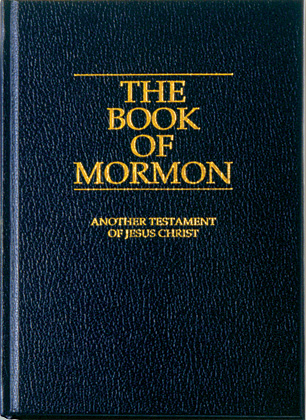Shortly before Lehi’s death, he told his sons:
Wherefore, this land is consecrated unto him whom he shall bring. And if it so be that they shall serve him according to the commandments which he hath given, it shall be a land of liberty unto them; wherefore, they shall never be brought down into captivity; if so, it shall be because of iniquity; for if iniquity shall abound cursed shall be the land for their sakes, but unto the righteous it shall be blessed forever. (2 Nephi 1:7)
 Lehi and his family resided in the Americas. Throughout the Book of Mormon, we see that this promise held true. The people who followed God and tried to keep the commandments did well. They were protected and generally prospered. Unfortunately, we soon see a cycle emerging in the book. The people would be righteous and so God would bless them. After a generation or two of prosperity, they would become prideful, taking credit for their blessings and prosperity, and leaving God out of it entirely. In other words, they felt it was their brilliance and skill that made them successful, not God’s help. With this change of attitude, they would not bother with the commandments and were soon living in a state of apostasy, ignoring God and focusing on the worldly pleasures of life. God would then withdraw his blessings, and the people would suffer. This forced them to realize they weren’t as brilliant as they might have felt, and after a time, they would be humbled, repent, and again begin to receive blessings. This happened repeatedly throughout the Book of Mormon years.
Lehi and his family resided in the Americas. Throughout the Book of Mormon, we see that this promise held true. The people who followed God and tried to keep the commandments did well. They were protected and generally prospered. Unfortunately, we soon see a cycle emerging in the book. The people would be righteous and so God would bless them. After a generation or two of prosperity, they would become prideful, taking credit for their blessings and prosperity, and leaving God out of it entirely. In other words, they felt it was their brilliance and skill that made them successful, not God’s help. With this change of attitude, they would not bother with the commandments and were soon living in a state of apostasy, ignoring God and focusing on the worldly pleasures of life. God would then withdraw his blessings, and the people would suffer. This forced them to realize they weren’t as brilliant as they might have felt, and after a time, they would be humbled, repent, and again begin to receive blessings. This happened repeatedly throughout the Book of Mormon years.
Today, Lehi’s prophecy continues to hold true. Lehi taught that the countries could not be overtaken when they lived in accordance with God’s principles. This protects the freedom of these countries from non-democratic control. This is not to say that when a country suffers, it means no one is righteous in it. This is a general, overall look at how the country operates.
One thing followers of Christ do when they vote is to pray about their choices. While God doesn’t endorse candidates, he can guide voters to know when a candidate will endanger their freedom. This is one way our righteousness can protect our countries from a complete loss of freedom. It’s important to take our right to vote seriously every time, so we choose only candidates who will keep our nation safe.
Christians today are in a constant battle to keep God from being deported from their countries. Many people misinterpret freedom of religion to mean no one may have religion at all, or that any hint of religion must be pushed into the churches and out of everyday life. Members of the Church of Jesus Christ of Latter-day Saints believe strongly in freedom of religion, which made possible the restoration of the gospel. However, they believe that this does not mean we must become an atheist nation, or a nation which ignores God entirely. While each person must choose for himself whether or not to believe in God and which church to join, and we must never end that right, we must also be careful to ensure that God’s principles are practiced in our nations, or we risk losing God’s protection over us.
We can choose to be in the cycle of prosperity and freedom, or we can choose to be in the cycle of bondage and suffering. It’s entirely up to us, as an interfaith group of citizens, to protect our homelands from losing God’s protection.
“By divine revelation, Joseph, between 1827 and 1829, translated the Book of Mormon, from which he learned that God is in fact the author of our liberty and that to retain it, the inhabitants of the land must be protected by his mighty hand. There is no other power that can protect that liberty.
The truths received by Joseph Smith went further. They identified the “Great God” implored by Samuel F. Smith
as Jesus Christ. They also declared that in order for us to enjoy the protection of his might, we must accept him as our God and keep his commandments.”—Marion G. Romney, “America’s Promise,” Ensign, Sep 1979, 3. President Romney was then second counselor to the prophet.
The late Terrie Lynn Bittner—beloved wife, mother, grandmother, and friend—was the author of two homeschooling books and numerous articles, including several that appeared in Latter-day Saint magazines. She became a member of the Church at the age of 17 and began sharing her faith online in 1992.


